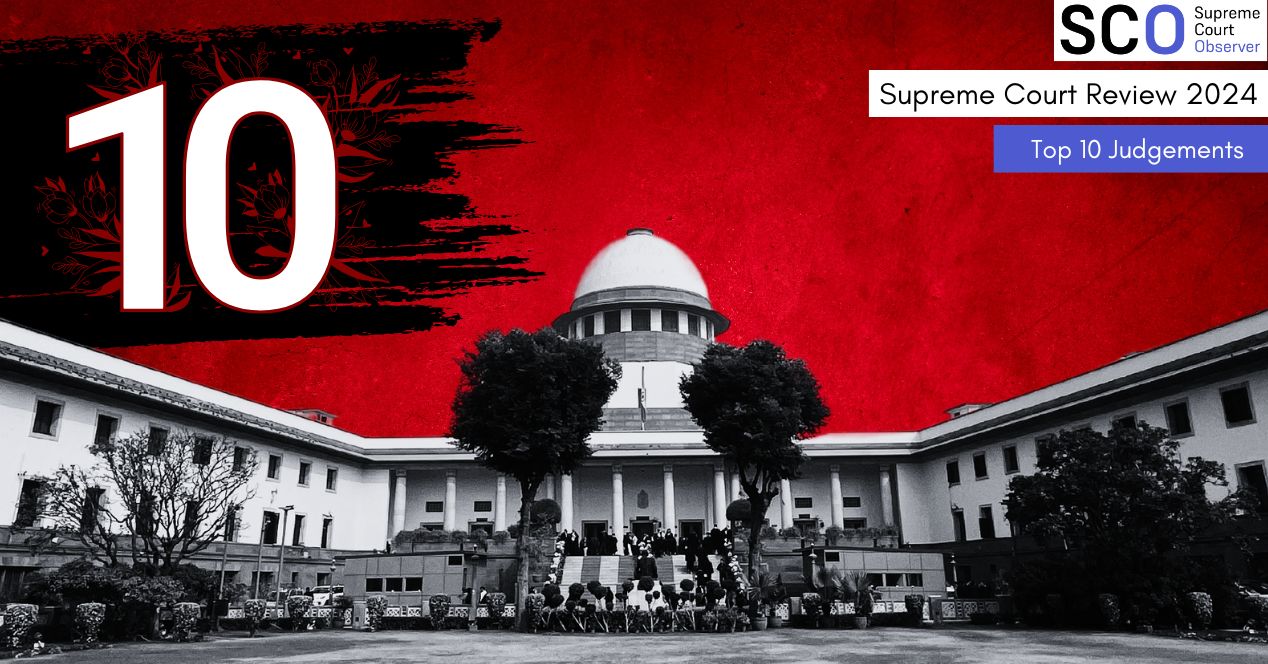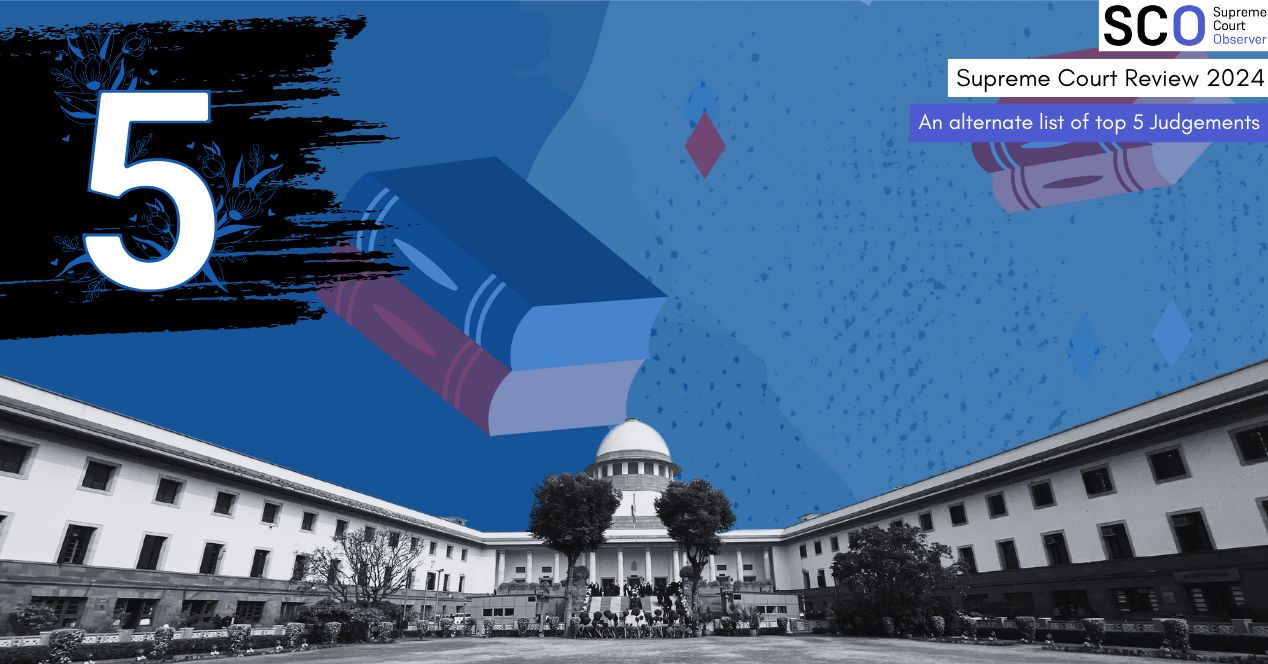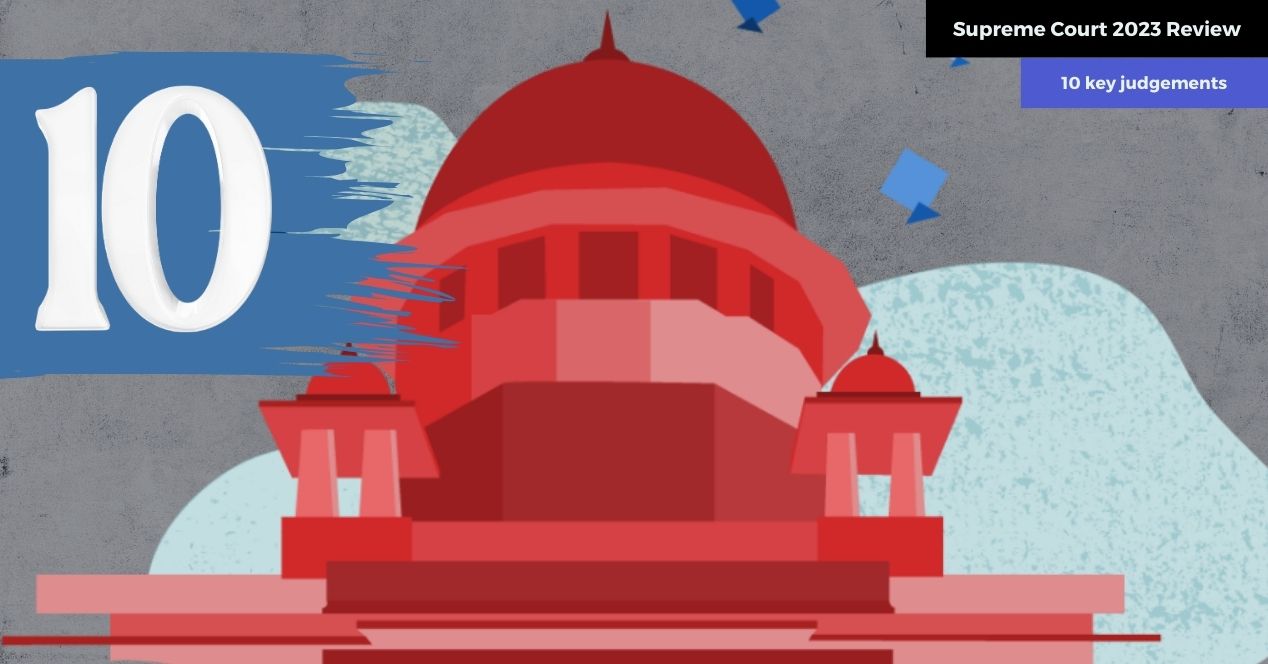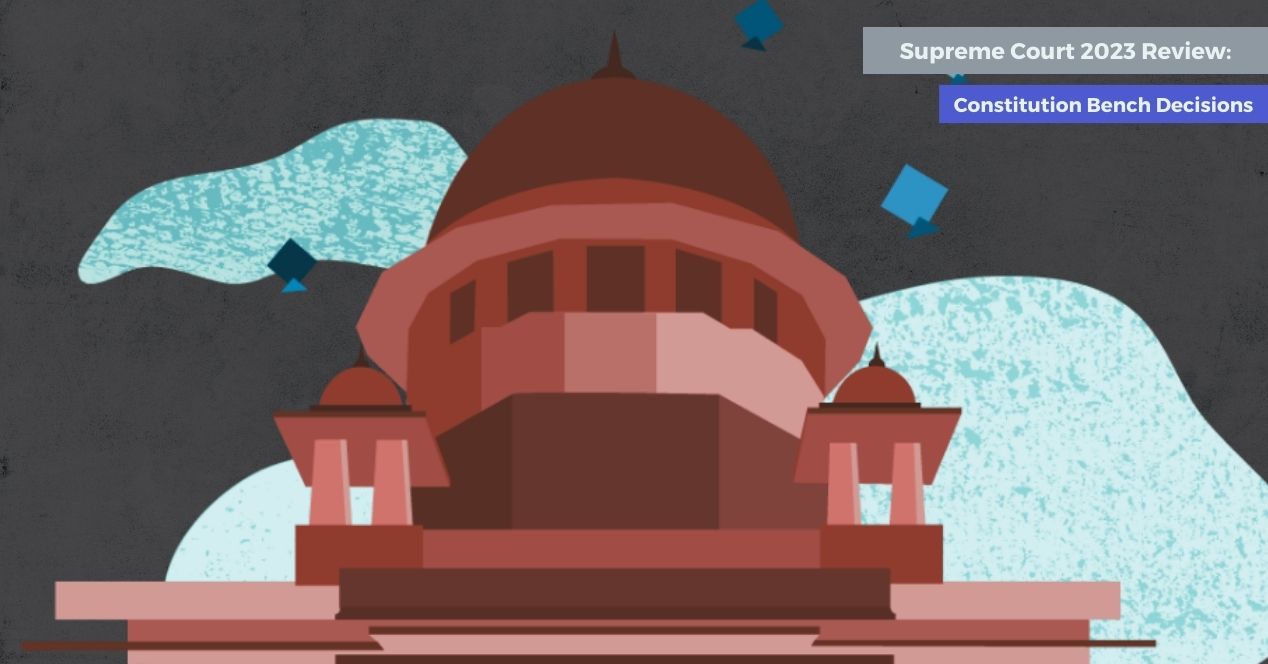Analysis
Supreme Court Review 2024: Constitution Bench decisions
SCO lists the 12 Constitution Bench judgements that were pronounced this year by the five, seven and nine-judge benches
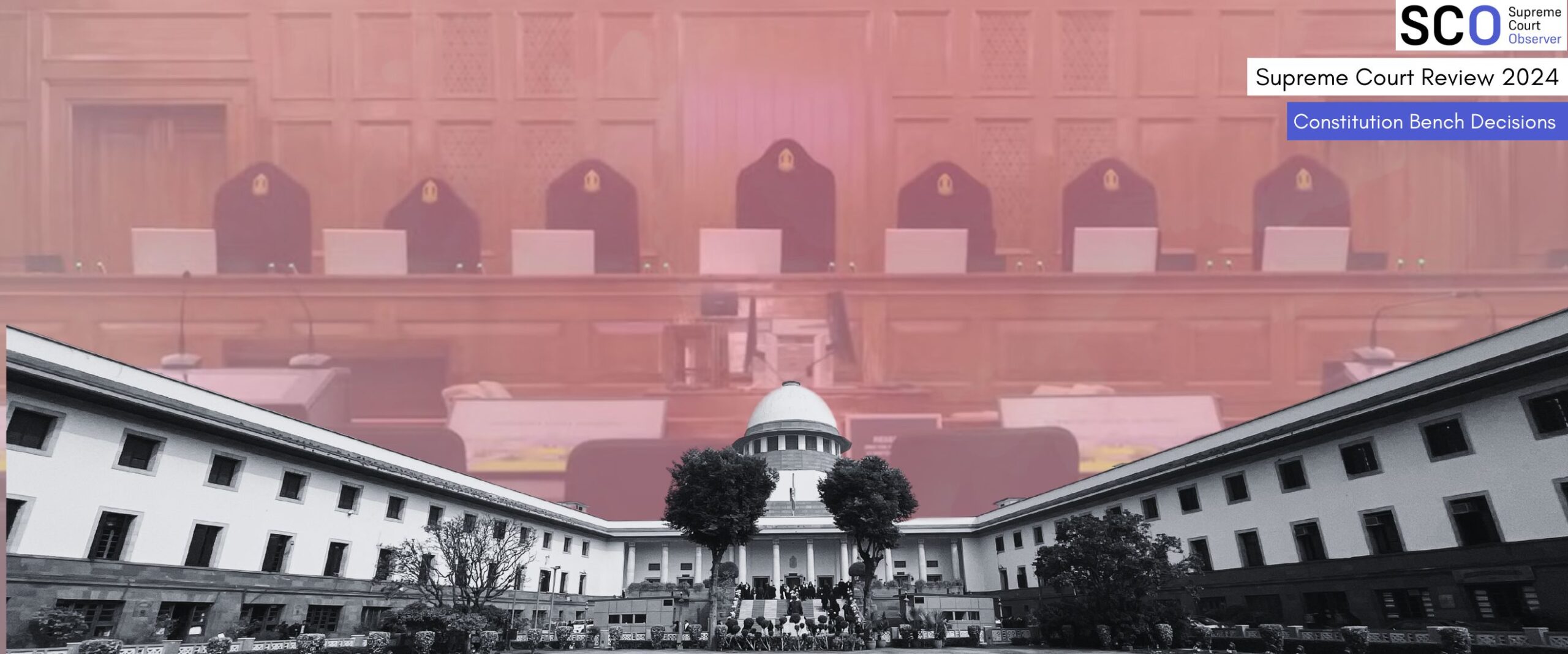
2024 was a busy year for Constitution Bench decisions. The Court delivered as many as 12 five-, seven- and nine-judge bench cases. Though in 2023 the Court had heard and cleared 18 such cases, 2024 still stands out as a remarkable year for constitution Bench activity, particularly compared to the four decisions in 2022 and three in 2021.
The 12 Constitution Bench decisions this year covered a diverse range of topics. All led by former Chief Justice D.Y. Chandrachud, the judgements dealt with free and fair elections, states powers to make laws and impose taxes, affirmative action and more.
This article compiles all the Constitution Bench cases of 2024 and highlights the key parts of the Court’s decisions.
1. Constitutionality of the Electoral Bonds Scheme | Five-judge bench
Association for Democratic Reforms v Union of India | Judgement: 15 February 2024
In a unanimous decision, the Supreme Court struck down the Union’s 2018 Electoral Bonds Scheme that facilitated donor anonymity in funding of political parties. Significantly, the bench held that the donor’s right to privacy could not come at the cost of the voter’s right to information.
The Court found the practice of “unlimited corporate funding” to cause a quid pro quo arrangement between the donor and the political party if they come into power. Donor identity, the Court held, was crucial for the voter to make informed decisions.
2. Automatic Vacation of Stay Orders | Five-judge bench
High Court Bar Association Allahabad v The State of Uttar Pradesh | Judgement: 29 February 2024
In Asian Resurfacing of Road Agency v Central Bureau of Investigation (2018), a Division Bench had held that a stay order automatically lapses within six months unless extended by a subsequent order.
Appellants argued that the decision in Asian Resurfacing amounted to “judicial legislation,” and disadvantaged litigants. The Union government contended that setting timelines for stay orders should be a legislative, not a judicial prerogative.
A five-judge bench of the Supreme Court unanimously held that stay orders should not lapse automatically and that vacating such orders should involve judicial discretion.
3. Legislative immunity for accepting bribes for speech or vote in the House | 7-judge bench
Sita Soren v Union of India | Judgement: 4 March 2024
A seven-judge bench overruled a 25-year-old decision in P.V. Narasimha Rao v State (1998). A five-judge bench had granted legislators immunity from criminal prosecution for bribery tied to their speeches or votes in Parliament or assembly.
This year, the Court held that bribery undermines democracy and observed that Narasimha Rao was a “paradoxical outcome” which protected legislators who acted on bribes while prosecuting those who abstained.
4. States power to tax mines and minerals | 9-judge bench
Mineral Area Development Authority v Steel Authority of India | Judgement: 25 July 2024
The Supreme Court, in an 8:1 decision, ruled that “royalty” under the Mines and Minerals (Development and Regulation) Act, 1957, is not a tax. They also held that states can levy taxes on mines and minerals under Entries 49 and 50 of the State List. This decision overrules India Cements v State of Tamil Nadu (1989), which classified royalty as a tax.
The majority held that royalty is a payment from miners to landowners and does not have the characteristics of a tax. Justice B.V. Nagarathna dissented, stating that royalty is akin to a tax as it is compulsory. She warned that the ruling could create an uneven tax regime benefiting mineral-rich states. A few days later, the judges also decided that the judgement applied retrospectively and directed mining companies to settle unpaid taxes in instalments over 12 years starting in 2026.
5. Validity of Sub-Classification Within Reserved Categories | 7-judge bench
State of Punjab v Davinder Singh | Judgement: 1 August 2024
In a 6:1 majority, the Supreme Court upheld the states’ power to create sub-classifications within the Scheduled Caste and Scheduled Tribe (SC/ST) categories. The judgement held that the different castes included under the SC/ST List were not homogenous since they faced varying degrees of discrimination. They also held that sub-classification does not amount to altering the Presidential List since no castes or tribes are added or removed from the List.
Justice Trivedi dissented, holding that sub-classification violates Article 14 as it unfairly treated other castes and tribes in the Presidential List by giving a preference to one over the other. She further held that states lacked the legislative competence to create sub-classifications.
6. Section 6A of the Citizenship Act, 1955 | 5-judge bench
In re: Section 6A of the Citizenship Act, 1955 | Judgement: 17 October 2024
In a 4:1 majority, a Constitution Bench upheld Section 6A of the Citizenship Act, 1955. The provision grants citizenship to migrants who entered Assam from Bangladesh before March 1971. The Court ruled that the provision applied only to pre-1971 migrants, and ordered Supreme Court-supervised hearings to identify and deport post-1971 migrants.
Even as the bench acknowledged the weak implementation of Section 6A, it rejected the petitioner’s argument that the provision altered Assam’s culture and demographics. The Court reasoned that the Constitution promotes fraternity and not cultural exclusivity.
In dissent, Justice Pardiwala held that Section 6A was invalid due to “temporal unreasonableness”. This means that the provision acquired unconstitutionality due to the passage of time as delays in deporting migrants had enabled sustained migration into Assam.
7. States’ power to regulate industrial alcohol | 9-judge bench
State of Uttar Pradesh v Lalta Prasad Vaish | Judgement: 23 October 2024
A nine-judge bench, in an 8:1 majority, held that state governments have the authority to regulate industrial alcohol under Entry 8 of the State List. The majority overturned Synthetics & Chemicals Ltd v State of Uttar Pradesh (1989), which had limited “intoxicating liquor” to potable alcohol. The bench ruled that “intoxicating liquor” is a broader term that includes both potable and industrial alcohol.
In her dissent, Justice Nagarathna maintained that “intoxicating liquor” should exclude industrial alcohol due to its importance in India’s chemical industry. This, she said, should remain under Union jurisdiction.
8. Nature of Private Property | 9-judge bench
Property Owners Association v State of Maharashtra | Judgement: 5 November 2024
The Supreme Court, in an 8:1 majority, held that not all privately owned property qualifies as a “material resource of the community” under Article 39(b) of the Constitution, a directive principle of state policy.
The bench also had to decide if Article 31C, as it existed after the Court’s decision in Kesavananada Bharati v State of Kerala continued to exist in the Constitution or if the provision was effaced from the Constitution after the decision in Minerva Mills v Union of India. The judges unanimously held that the provision remains in the Constitution, noting that striking down an amendment which expanded the scope of the Article, did not delete the provision in its entirety.
Justice Dhulia dissented, stating that all private property was a material resource of the community.
9. Validity of ‘Light Motor Vehicle’ Licence to Drive ‘Transport Vehicle’ | 5-judge bench
Bajaj Allianz General Insurance v Rambha Devi | Judgement: 6 November 2024
A five-judge bench of the Supreme Court held that a Light Motor Vehicle (LMV) licence permits the holder to drive transport vehicles weighing under 7500 KGs without requiring a separate licence under the Motor Vehicles Act, 1988.
However, the Court clarified that a separate licence is mandatory for vehicles such as e-rickshaws, e-cars and those carrying hazardous goods. A separate licence would only be required if the transport vehicle is in the medium and heavy class (more than 7500 KGs).
Lastly, the bench directed the Union government to propose amendments to the Act to address the inconsistencies which caused confusion between transport vehicles and LMVs.
10. Altering rules for appointment to public posts | 5-judge bench
Tej Prakash Pathak v Rajasthan High Court | Judgement: 7 November 2024
The Supreme Court ruled unanimously that public sector employers cannot modify recruitment rules after the process has commenced. The judgment arose from a challenge by candidates applying for translator positions at the Rajasthan High Court, where a 75% written examination cut-off was introduced post-exam and interview.
The Court clarified that while employers have discretion to frame rules to identify suitable candidates, benchmarks for evaluation must be established before the recruitment process begins. The recruiting authority must adhere to established rules, regulations, and constitutional principles.
11. Aligarh Muslim University’s minority status | 7-judge bench
Aligarh Muslim University Through its Registrar Faizan Mustafa v Naresh Agarwal | Judgement: 8 November 2024
In a 4:3 majority, the bench overruled Azeez Basha v Union of India (1967) which held that Aligarh Muslim University (AMU) did not have minority status under Article 30, as it was established through Union legislation.
Notably, the Court for the first time in 75 years also laid down parameters to determine a minority institution. The majority, in the present case, held that an institution can be considered a minority institution if it is “established” by members of a minority community, with the “administration” of the institution being a consequence of its establishment.
A regular bench will use these parameters to study the minority status of AMU.
12. Appointment of arbitrators by ineligible persons | 5-judge bench
Central Organisation For Railway Electrification v ECL-SPIC-SMO-MCML (JV) | Judgement: 8 November 2024
The Supreme Court held that arbitration clauses which provided for unilateral appointments to the arbitral tribunal were invalid. Unilateral appointments, the bench also held that the principle of equal treatment applied from the time of selecting the panel of arbitrators.
The majority led by former CJI Chandrachud noted that unilateral appointments violated Article 14 of the Constitution. to
In their separate, partial dissent, Justices Hrishikesh Roy and P.S. Narasimha noted that the equality amongst parties was enshrined under the Arbitration Act itself and cautioned against applying principles of constitutional law to private matters of arbitration.

